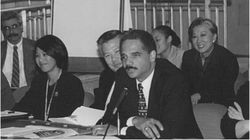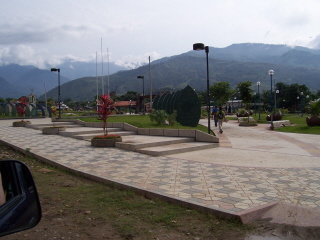When he got a 93-year sentence for a small medical marijuana grow in Oklahoma, Will Foster became a poster child for drug war abuses. A national campaign helped free him, and he headed for the friendlier climes of northern California, which released him from parole after three years. But Oklahoma wants him back, and now Foster has been in jail in California for the past 15 months fighting extradition. He needs your help.
As the United Nations issues its annual World Drugs Report, UNODC head Antonio Maria Costa finally notices his anti-prohibitionist critics and fights back. The critics are glad to engage. More importantly, Costa's attack signals that the legalization movement is gaining momentum.
At least 16 Asian nations and an equal number of others, including the US, apply the death penalty to certain drug offenses. It's time for that to stop, said human rights and harm reduction organizations, and they are using UN anti-drug day to pressure both the international community and offending countries to act now.
A Prince Georges County, Maryland, SWAT team raided a mayor's house last summer, shot his two dogs, and manhandled the mayor and his mother-in-law because they thought they were marijuana traffickers. They weren't, and the cops have acknowledged as much. Now the county sheriff has investigated the incident and concluded his boys did nothing wrong. The mayor disagrees -- and he's going to court.
With movement to reduce or end the sentencing disparity between federal crack and powder cocaine offenses growing, the Obama administration has come down firmly in favor of eliminating the disparity altogether.
There has been some concern that the US Supreme Court would let an Arizona school district get away with strip-searching a junior high school girl while looking for some ibuprofen tablets. It didn't.
You go, Barney! Congressman Barney Frank has introduced a bill that would decriminalize the possession of up to nearly a quarter-pound of marijuana and the not-for-profit distribution of up to an ounce. It's a start.
More drug corruption in Philly, more fallout from the Kathryn Johnston killing in Atlanta, and yet another crooked border guard.
Attempting to appease the opposition of Democratic Gov. John Lynch, the New Hampshire legislature has approved a medical marijuana bill that forbids patients from growing their own -- they would have to go to a "compassion center." Will that be enough to satisfy the governor?
Coca and cocaine production are down slightly in South America, thanks largely to Colombia's continuing manual and aerial eradication campaigns, the UN reports. But despite the billions spent to suppress the trade, a gram of coke now costs about half of what it did 20 years ago.
South Korean authorities and public opinion take a hard line toward marijuana, so when a leading actress speaks out for legalization, the outrage is palpable.
Bryan Epis was the first medical marijuana provider to be prosecuted by the federal government, and he is one of dozens of people whose fate is still caught up in the federal system despite recent policy shifts by the Obama administration. Bryan is asking all of us to take action to help those who have risked much to help patients.
Events and quotes of note from this week's drug policy events of years past.
"LEAP Confronts the Drug Czar at a Press Conference," "Supreme Court Upholds Fourth Amendment in Strip Search Case," "United Nations Argues for Decriminalization," "United Nations Admits That Drug Legalization is Gaining Support," "You Don't Need Drug Laws to Punish People Who Steal," "Police Raid Innocent Elderly Couple, Blame It on the Weather," "Police Applaud Themselves for Raiding Innocent People and Killing Dogs," "Marijuana Debate on CNN," "Is DEA Illegally Forcing Agents to Serve in Afghanistan?"
The killing of Tarika Wilson, an unarmed mother holding her child, and the maiming of that child, is an inevitable consequences of the overuse of SWAT teams and the growing paramilitarization of the drug war.
Do you read Drug War Chronicle? If so, we need your feedback to evaluate our work and make the case for Drug War Chronicle to funders. We need donations too.
Apply for an internship at DRCNet and you could spend a semester fighting the good fight!
Will Foster became a poster child for the mindless cruelties of the drug war more than a decade ago. The Tulsa computer consultant and medical marijuana user -- he suffers from degenerative arthritis -- was raided by police with a warrant for a methamphetamine lab back in 1995. Police found no meth, but they did find a small marijuana garden. The unfortunate Foster was convicted of cultivation and sentenced in 2007 to a mind-blowing 93 years in prison.

Will Foster (medicalmarijuanaofamerica.com)
It took a growing national movement and, ultimately, an Oklahoma Supreme Court decision to get that sentence redressed. After the state high court threw out his sentence, Foster was resentenced to 20 years, twice denied parole, then finally paroled to the more medical marijuana-friendly state of California, where he moved in temporarily with "Guru of Ganja" Ed Rosenthal, who had testified in his defense in Oklahoma and then befriended him.
And they all lived happily ever after, right? Wrong. Although Foster settled into a law-abiding life in Northern California, picking up a new family along the way, and successfully completed what the state of California considered an adequate parole period, that wasn't good enough for the state of Oklahoma. Upset that California officials hadn't kept him on parole as long as they would have, Oklahoma parole officials demanded that he return to that benighted state to finish his parole and when he, perhaps understandably, declined, issued a warrant for his arrest for violating the terms of his parole.
Nothing came of that until Foster had his ID checked in a police encounter, but then, the pending Oklahoma warrant popped up, and Foster was jailed in California to be returned to Oklahoma to finish the rest of his sentence. With nothing to lose, Foster fought the warrant by filing a writ of habeas corpus and winning its dismissal in the California courts in 2006.

Susie Mueller and family
Once again, Foster was a free man, but Oklahoma still wasn't done with him. Oklahoma parole officials then offered to reinstate him in the interstate compact, which governs the supervision of parolees who parole to states other than the one in which they were sentenced, but then added that they had made a mistake when originally calculating the length of his parole period. His parole didn't end in 2011, but in 2015, they said, demanding he sign a document to that effect. Again, perhaps understandably, Foster declined that offer, and again, the state of Oklahoma issued another warrant for his arrest for violating the terms of his parole.
By then, Foster had moved to Santa Rosa, California, about 50 miles north of San Francisco, and was in a relationship with and supporting a local woman, Susie Mueller, and her three daughters. At Foster's residence, he had a medical marijuana grow, all completely legal under state law and county guidelines. But he also had a personal enemy, Mueller's estranged husband, who told law enforcement officials he was operating a major marijuana grow operation.
The next thing Foster and Mueller knew, DEA agents and Sonoma County sheriff's deputies were kicking down Foster's door, the couple was arrested on state marijuana cultivation charges, and Mueller's youngest daughter was taken into custody as an endangered child.
"It was terrible," said Mueller. "They did a full-on raid and arrested him over seven mature plants, and they arrested me and took my daughter away. They thought because he knew Ed there was something big going on. They said if I told them where the other grows were, they wouldn't arrest me and take my daughter. I told them that's all there was and that he was within the guidelines, and they said 'take her kid,' and they arrested me."
A hard-nosed Sonoma County prosecutor delayed months before dropping the baseless charges, and Foster sat in the Sonoma County Jail the whole time. But even after the charges were dropped, Foster remains behind bars, fighting the extradition warrant back to Oklahoma. It's now going on 16 months of imprisonment for him.
"In their warrant, they said I violated the terms and conditions of parole in Oklahoma, then fled Oklahoma to escape justice," Foster said Wednesday in a phone call from the jail. "But I haven't been back in Oklahoma since I left in 2001. I successfully finished parole here, I beat back that earlier extradition effort, and they're still coming after me."
California Gov. Arnold Schwarzenegger routinely signed off on the Oklahoma warrant without knowing all the facts, Foster said. "The governor has not been given all the information. Oklahoma didn't tell him I had finished parole, had an earlier extradition attempt thrown out, or that they had tried to extend my parole six years after the fact," he pointed out.
Neither the California nor the Oklahoma governors' offices nor Oklahoma parole officials responded to Chronicle inquiries about the Foster case.
Now, with his options running out, Foster and his supporters are pursuing two strategies, one political and one judicial. The first is aimed at the two governors, urging them to revoke the warrants. The second is to file another writ of habeas corpus, which Foster said he would do at the end of this month. Otherwise, he will be taken back to Oklahoma in shackles before July is over.
"I am asking the governor of Oklahoma to recall the warrant and commute my sentence and let me live in peace in California and just leave me alone," he said. "I'm asking Gov. Schwarzenegger to not honor the extradition request. There is case law suggesting that he does not have to grant extradition; he can deny it and recall his warrant."
Ed Rosenthal is leading the campaign to free Foster. On his blog is complete information about how to contact the two governors to ask them to recall the warrants.
"Every human being whose life is disrupted because of the marijuana laws deserves our attention, but Will's case is important first because people already know about the terrible injustice done to him back in Oklahoma, and second because it's just so weird and egregious," said Rosenthal. "People just shake their heads and say this shouldn't be happening. We're trying to get him out, and we're trying to bring this injustice to the attention of people who don't already know about it," he said.
"Apparently, Oklahoma has a lot of money to burn on this vindictiveness," he noted. "This is a sad and stupid case."
It's costing cash-strapped California, too. The cost for imprisoning Foster for the past 15 months is now in excess of $100,000, and that doesn't include the cost of the bogus marijuana cultivation prosecution.
"I'll be filing a habeas writ on June 29," Foster said, "and the state will have 15 days to respond. There will probably be a hearing in 30 days."
It's unusual for habeas writs to be granted, and Foster is uncertain about his prospects for victory, but is prepared for the long haul. "If I don't win there, I can drag this out for years. I could go all the way to the California Supreme Court, and then into the federal courts. But that would require that I continue to sit here in jail," he said.
Susie Mueller visits Foster in jail almost every day. "This is heartbreaking for me, it's very emotionally difficult because he shouldn't be in there," she said. "But I'm really devoted to him. I go almost every night, and we talk for an hour and play tic-tic-toe and go over the case."
In one of the strange ironies of Foster's ordeal, Mueller said she had gathered signatures for petitions seeking his release when he was imprisoned in Oklahoma a decade ago. "I met him at work here in Santa Rosa and didn't even realize he was that Will Foster," she laughed. "What a coincidence."
"Ed and Susie are the best advocates a guy could have," said Foster. "I'm so grateful for all they're doing."
For Foster, Oklahoma's efforts to punish him further are not about justice, but vengeance. "I beat them on the sentencing, I beat them on the first extradition warrant, and they want to teach me a lesson," he said. "They want to impose their authority."
Right now, the decision to extradite Foster back to Oklahoma is up to the two governors and their extradition specialists. An outpouring of public support in favor of allowing Foster to remain in California as a free man could make the difference.
back to top
As the world marks the end of the first century of drug prohibition -- the first international anti-drug convention was signed in Shanghai in 1909 -- the global anti-drug bureaucracy finds itself on the defensive. Faced with a rising chorus of critics, the bureaucracy fought back this week as the United Nations Office on Crime and Drugs (UNODC) issued its World Drugs Report 2009. That the UNODC finally feels compelled to confront -- instead of ignore -- its critics is a sign of progress.

HCLU demonstration at March '09 UN drug summit, Vienna
In addition to its usual quantifying of marginal changes in drug production and consumption levels and exhortations to try harder to fight the drug menace, this year's report was remarkable for its preface, penned by UNODC head Antonio Maria Costa, and, in a reversal of tone if not policy, some approving mention of Portugal's eight-year-old experiment with decriminalization.
On decriminalization in Portugal the report noted that:
Portugal is an example of a country that recently decided not to put drug users in jail. According to the International Narcotics Control Board, Portugal's "decriminalization" of drug usage in 2001 falls within the Convention parameters: drug possession is still prohibited, but the sanctions fall under the administrative law, not the criminal law. Those in possession of a small amount of drugs for personal use are issued with a summons rather than arrested. The drugs are confiscated and the suspect must appear before a commission. The suspect's drug consumption patterns are reviewed, and users may be fined, diverted to treatment, or subjected to probation. Cases of drug trafficking continue to be prosecuted, and the number of drug trafficking offenses detected in Portugal is close to the European average.
These conditions keep drugs out of the hands of those who would avoid them under a system of full prohibition, while encouraging treatment, rather than incarceration, for users. Among those who would not welcome a summons from a police officer are tourists, and, as a result, Portugalâs policy has reportedly not led to an increase in drug tourism. It also appears that a number of drug-related problems have decreased.
The report then goes on to say that "while incarceration will continue to be the main response to detected traffickers, it should only be applied in exceptional cases to users." Combined with Costa's "people who take drugs need medical help, not criminal retribution," in the preface, it suggests that the UNODC would not oppose decriminalization, but the report doesn't say that. Instead, it advocates for drug courts and drug treatment.
When it comes to legalization, in the preface, Costa acknowledged his anti-prohibitionist critics and attempted to confront their arguments. His comments are worth quoting at length:
"...Of late, there has been a limited but growing chorus among politicians, the press, and even in public opinion saying: drug control is not working. The broadcasting volume is still rising and the message spreading. Much of this public debate is characterized by sweeping generalizations and simplistic solutions. Yet, the very heart of the discussion underlines the need to evaluate the effectiveness of the current approach. Having studied the issue on the basis of our data, UNODC has concluded that, while changes are needed, they should be in favor of different means to protect society against drugs, rather than by pursuing the different goal of abandoning such protection.
.
Several arguments have been put forward in favor of repealing drug controls, based on (i) economic, (ii) health, and (iii) security grounds, and a combination thereof.
The economic argument for drug legalization says: legalize drugs, and generate tax income. This argument is gaining favor, as national administrations seek new sources of revenue during the current economic crisis. This legalize and tax argument is unethical and uneconomical. It proposes a perverse tax, generation upon generation, on marginalized cohorts (lost to addiction) to stimulate economic recovery. Are the partisans of this cause also in favor of legalizing and taxing other seemingly intractable crimes like human trafficking? Modern day slaves (and there are millions of them) would surely generate good tax revenue to rescue failed banks. The economic argument is also based on poor fiscal logic: any reduction in the cost of drug control (due to lower law enforcement expenditure) will be offset by much higher expenditure on public health (due to the surge of drug consumption). The moral of the story: don't make wicked transactions legal just because they are hard to control.
Others have argued that, following legalization, a health threat (in the form of a drug epidemic) could be avoided by state regulation of the drug market. Again, this is naive and myopic. First, the tighter the controls (on anything), the bigger and the faster a parallel (criminal) market will emerge -- thus invalidating the concept. Second, only a few (rich) countries could afford such elaborate controls. What about the rest (the majority) of humanity? Why unleash a drug epidemic in the developing world for the sake of libertarian arguments made by a pro-drug lobby that has the luxury of access to drug treatment? Drugs are not harmful because they are controlled -- they are controlled because they are harmful; and they do harm whether the addict is rich and beautiful, or poor and marginalized.
The most serious issue concerns organized crime. All market activity controlled by the authority generates parallel, illegal transactions, as stated above. Inevitably, drug controls have generated a criminal market of macro-economic dimensions that uses violence and corruption to mediate between demand and supply. Legalize drugs, and organized crime will lose its most profitable line of activity, critics therefore say. Not so fast. UNODC is well aware of the threats posed by international drug mafias. Our estimates of the value of the drug market (in 2005) were groundbreaking. The Office was also first to ring the alarm bell on the threat of drug trafficking to countries in West and East Africa, the Caribbean, Central America and the Balkans. In doing so we have highlighted the security menace posed by organized crime, a matter now periodically addressed by the UN Security Council. Having started this drugs/crime debate, and having pondered it extensively, we have concluded that these drug-related, organized crime arguments are valid. They must be addressed. I urge governments to recalibrate the policy mix, without delay, in the direction of more controls on crime, without fewer controls on drugs. In other words, while the crime argument is right, the conclusions reached by its proponents are flawed. Why? Because we are not counting beans here: we are counting lives. Economic policy is the art of counting beans (money) and handling trade-offs: inflation vs. employment, consumption vs. savings, internal vs. external balances. Lives are different. If we start trading them off, we end up violating somebody's human rights. There cannot be exchanges, no quid-pro-quos, when health and security are at stake: modern society must, and can, protect both these assets with unmitigated determination. I appeal to the heroic partisans of the human rights cause worldwide, to help UNODC promote the right to health of drug addicts: they must be assisted and reintegrated into society. Addiction is a health condition and those affected by it should not be imprisoned, shot-at or, as suggested by the proponent of this argument, traded off in order to reduce the security threat posed by international mafias. Of course, the latter must be addressed, and below is our advice.
First, law enforcement should shift its focus from drug users to drug traffickers. Drug addiction is a health condition: people who take drugs need medical help, not criminal retribution. Attention must be devoted to heavy drug users. They consume the most drugs, cause the greatest harm to themselves and society -- and generate the most income to drug mafias. Drug courts and medical assistance are more likely to build healthier and safer societies than incarceration. I appeal to Member States to pursue the goal of universal access to drug treatment as a commitment to save lives and reduce drug demand: the fall of supply, and associated crime revenues, will follow. Let's progress towards this goal in the years ahead,and then assess its beneficial impact on the next occasion Member States will meet to review the effectiveness of drug policy (2015).
Second, we must put an end to the tragedy of cities out of control. Drug deals, like other crimes, take place mostly in urban settings controlled by criminal groups. This problem will worsen in the mega-cities of the future, if governance does not keep pace with urbanization. Yet, arresting individuals and seizing drugs for their personal use is like pulling weeds -- it needs to be done again the next day. The problem can only be solved by addressing the problem of slums and dereliction in our cities, through renewal of infrastructures and investment in people -- especially by assisting the youth, who are vulnerable to drugs and crime, with education, jobs and sport. Ghettos do not create junkies and the jobless: it is often the other way around. And in the process mafias thrive.
Third, and this is the most important point, governments must make use, individually and collectively, of the international agreements against uncivil society. This means to ratify and apply the UN Conventions against Organized Crime (TOC) and against Corruption (CAC), and related protocols against the trafficking of people, arms and migrants. There is much more our countries can do to face the brutal force of organized crime: the context within which mafias operate must also be addressed...
To conclude, transnational organized crime will never be stopped by drug legalization. Mafias coffers are equally nourished by the trafficking of arms, people and their organs, by counterfeiting and smuggling, racketeering and loan-sharking, kidnapping and piracy, and by violence against the environment (illegal logging, dumping of toxic waste, etc). The drug/crime trade-off argument, debated above, is no other than the pursuit of the old drug legalization agenda, persistently advocated by the pro-drug-lobby (Note that the partisans of this argument would not extend it to guns whose control -- they say -- should actually be enforced and extended: namely, no to guns, yes to drugs).
So far the drug legalization agenda has been opposed fiercely, and successfully, by the majority of our society. Yet, anti-crime policy must change. It is no longer sufficient to say: no to drugs. We have to state an equally vehement: no to crime. There is no alternative to improving both security and health. The termination of drug control would be an epic mistake. Equally catastrophic is the current disregard of the security threat posed by organized crime."
While Costa's preface can only be read as an attack on the anti-prohibitionist position (while essentially calling for decriminalization of drug use), it also marks an engagement with the anti-prohibitionists. And they are ready to engage right back at him.
"The UN drug czar is talking out of both sides of his mouth. On the one hand he admits global drug prohibition is destabilizing governments, increasing violence, and destroying lives," said Ethan Nadelmann, executive director of the Drug Policy Alliance. "But on the other hand he offers facile arguments dismissing the need for serious debate on alternative drug policies. The report erroneously assumes that prohibition represents the ultimate form of control when in fact it represents the abdication of control," Nadelmann added.
"The world's 'drug czar,' Antonio Maria Costa, would have you believe that the legalization movement is calling for the abolition of drug control," said Jack Cole, executive director of Law Enforcement Against Prohibition (LEAP) and a retired undercover narcotics detective. "Quite the contrary, we are demanding that governments replace the failed policy of prohibition with a system that actually regulates and controls drugs, including their purity and prices, as well as who produces them and who they can be sold to. You can't have effective control under prohibition, as we should have learned from our failed experiment with alcohol in the US between 1920 and 1933."
LEAP wants to keep the conversation going, and it wants citizens around the world to let the UNODC head know what they think. "We're asking people to go to http://www.DrugWarDebate.com, where they can send a message to the world 'drug czar' to educate him about the effects of policies he is supposed to be leading on," said Cole. "Now is the time for action. It's clear that prohibitionists are concerned about reformers' rapidly growing political clout when they attack us on page one of their annual report but didn't even mention us in last year's."
After ignoring anti-prohibitionist critics for years -- the legalization movement wasn't even mentioned in last year's report -- the global anti-drug bureaucracy has come out swinging. Costa has made his best case for smarter, better drug prohibition, and his arguments deserve to be addressed seriously.
But as successful nonviolent social movement leader Mohandas Gandhi famously observed: "First they ignore you, then they ridicule you, then they fight you, then you win." It appears that the anti-prohibitionist struggle is now in its penultimate stage.
back to top
In April, two Thai citizens, Sureeya Wuttisat, 45, and Asan Tong, 47, were sentenced to death in Malaysia after being convicted of trafficking about 40 pounds of marijuana. The sentence may be an outrage, but it is not a fluke. At least 16 countries in Asia apply the death penalty for some drug offenses, and an equal number in the rest of the world, including the United States, do, too.

Death sentence is passed against a woman who was immediately executed with three other people on drugs charges. (UN International Anti-Drugs Day, 6/26/03) sina.com.cn via Amnesty International web site)
Today is the United Nations'
International Day Against Drug Abuse and Illicit Trafficking, and in recent years, China has taken to marking it by executing drug offenders. This year, China got off to an early start,
killing six people for drug offenses yesterday. Last year, Indonesia joined China in the gruesome festivities, as it, too, put drug offenders to death.
This year, a consortium of human rights and harm reduction organizations are using UN anti-drug day to challenge the resort to the death penalty for drug offenses. Human Rights Watch, Amnesty International, the International Harm Reduction Association, and the Anti-Death Penalty Asia Network (ADPAN) have joined together to call on Asian governments to end the death penalty for drug offenses.
The groups say they do not know how many people are sentenced to death or executed because many countries in the region do not make available information on the death penalty. But a perusal of the archives of the anti-death penalty group Hands Off Cain shows that so far this year, a minimum of 69 people have been executed for drug offenses and 14 more sentenced to death.
If these publicly available accounts accurately reflect who is being sentenced to death or executed and where, Iran is by far the leading drug war executioner. (Reports from China, the other likely drug execution leader, are rare.) So far this year, Iran has executed at least 59 people for drug offenses, with China reporting eight, and Saudi Arabia two. During this same period, seven people have been sentenced to death for drug offenses in Malaysia, six in China, and one in Vietnam.
The executions and death sentences come even as the world moves toward restricting or abolishing the death penalty. Last year, only 25 countries carried out executions. And they come despite any evidence that they have any impact on drug trafficking or consumption. As the UN itself noted in 1988, 1996, and 2002, "research has failed to provide scientific proof that executions have a greater deterrent effect than life imprisonment. Such proof is unlikely to be forthcoming. The evidence as a whole gives no positive support to the deterrent hypothesis."
Countries using the death penalty for drug offenses are also violating UN human rights standards. The UN holds that the death penalty should be imposed only as an "exceptional measure" for "the most serious crimes" where "there was an intention to kill which resulted in the loss of life."
Building on a campaign to end the death penalty for drug offenses by the IHRA's HR2 (harm reduction and human rights), ADPAN, Amnesty International, Human Rights Watch and the IHRA are using UN anti-drug day to appeal to Asian governments to:
- Introduce an immediate moratorium on executions with a view to the abolition of the death penalty in line with UN General Assembly resolution 62/149 and 63/168 on "moratorium on the use of the death penalty";
- Commute all death sentences, including for drug offenses;
- Remove provisions within their domestic legislation that allow for the death penalty for drug offenses;
- Abolish the use of mandatory sentencing in capital cases;
- Publicize statistics on the death penalty and facts around the administration of justice in death penalty cases; and
- Use the occasion of Anti-Drugs Day 2009 to highlight public health policies that have proven effective in reducing drug-related harms.
"The problem with the death penalty for drug offenses is that it plainly violates international law," said Human Rights Watch's Rebecca Schleifer. "The UN rapporteur has made it clear that the death penalty for drug offenses violates international human rights law."
In many countries with the death penalty for drug offenses, Schleifer noted, judicial processes are faulty and due process is lacking. In some of them, including Malaysia and Singapore, the death penalty is mandatory in some drug cases, again a violation of international standards for fair trials.
Not only does the death penalty for drug offenses not deter potential offenders, it works against reducing the harms of drug use, Schleifer said. "Our work has found time and time again that excessive punishments and repressive drug law enforcement actually drive people away from life-saving health services," she observed.
"The movement against the death penalty is one that has been long fought and one that is clearly moving in the direction of international abolition," said IHRA's Rick Lines, the author of a 2007 IHRA report on the death penalty for drug offenses. "Yet for many years, the specific issue of the death penalty for drugs has been largely invisible, both within the drug reform movement and the anti-death penalty movement. But now we are seeing a shift in that, with many more people and organizations speaking out, not only on the basis that the death penalty for drugs violate international law, but also that it epitomizes an enforcement-centered approach to drug policy that is a failure in every respect."
Today's joint statement is significant, said Lines, because it brings together major international human rights and harm reduction organizations. "This shows the potential of the death penalty issue to build bridges and working relationships between these two important movements," he said. "That will only enhance the prospects for policy and legislative change. Clearly, no government is likely to change policy before people start making those demands. We now hear those demands becoming louder and more focused."
"Government attitudes do change," said ADPAN's Andrew de Cruz, citing the abolition of the death penalty in Burundi and Togo in the last few weeks, Vietnam's reduction in the number of death penalty offenses, and changes in death penalty practices in China. He might well have also cited Iran, which despite its high number of drug executions, has hinted that it wants to reduce executions overall.
"For these changes to continue it is important to ensure we convey the messages that the death penalty violates human rights and that it does not help deter crime," de Cruz said. "When it comes to drug offences, we can make further arguments that the death penalty for drug offenses is illegal under international human rights law, and that it has actually been counterproductive to policies known to help prevent some of the harmful health consequences of drugs to individuals and societies."
Applying pressure to individual countries is only part of the campaign, said Schleifer. "We would like all of the UN human rights agencies as well as the UN Office on Drugs and Crime to speak out definitively against the use of the death penalty as a violation of international law," she said. "Last year, UNODC came close when it talked about asking states to reconsider the use of the death penalty for drug offenses, but we would like to see them step up and recognize what international law says."
Last year, the UN General Assembly issued a resolution calling for a moratorium on the death penalty, Schleifer noted. "We would like to see the UN repeat that," she said. "Not just the General Assembly, but also UNODC joining publicly."
The campaign against the death penalty for drug offenses is well underway, but it still has a long way to go. If you are reading these words on UN anti-drug day, you know that the ritual state murders to mark it have already begun.
back to top
The Prince Georges County, Maryland, Sheriff's Department has finished its investigation into a drug raid last summer in which deputies charged into the home of the mayor of Berwyn Heights and killed two family dogs. Not surprisingly, the department cleared itself of any wrongdoing.

PolitickerMD cartoon about the raid on the Calvo home
Equally unsurprisingly, Berwyn Heights Mayor Cheye Calvo, one of the victims of the raid, disagrees. He said in a
Monday press conference he was would file a lawsuit in Prince Georges County Circuit Court against officials in the sheriff's office and police department. Calvo said he will seek to force the county to change its policies for deploying SWAT teams, adding that he believes there are problems with how the force serves search warrants, treats animals, and detains people.
PG Sheriff Michael Jackson doesn't see it that way. The departmental review of the raid was "consistent with what I've felt all along: My deputies did their job to the fullest extent of their abilities," he said at a news conference last Friday as he announced the whitewash.
The raid drew national attention when SWAT team members tracking a package of marijuana delivered to the Calvo home without the residents' knowledge burst into the house, shot and killed the family's two Labrador retrievers, and detained Calvo and his mother-in-law for several hours. One dog was shot four times by the front door. The other was shot twice as it ran from officers. The sheriff's office later admitted that the Calvos had nothing to do with the drug delivery, which was a ruse by traffickers to avoid shipping to their own locations (and avoiding SWAT raids like the one the Calvos endured).
"I'm sorry for the loss of their family pets," Jackson said. "But this is the unfortunate result of the scourge of drugs in our community. Lost in this whole incident was the criminal element... In the sense that we kept these drugs from reaching our streets, this operation was a success."
Again, Calvo disagreed. "It's outrageous," he said. "Not only is he not admitting any wrongdoing, but he's saying this went down the way it was supposed to and he's actually commending his police officers for what they did."
The botched raid has already led to a new Maryland law imposing strict reporting requirements on SWAT teams. Now, given the instransigence of the sheriff's office, it may result in even more changes in gung-ho policing, at least in Prince Georges County.
[Ed: Sheriff Jackson was not entirely straightforward with the public during his press conference last week. First, when he said they were successful in the sense that they "kept these drugs from reaching our streets," that was flat out not true. The package was intercepted by police in Arizona. It was disguised members of Sheriff Jackson's force who delivered the package to the home, before they staked it out waiting for someone to come back and bring it inside. Maybe they just couldn't think of any of the obvious alternatives to doing a SWAT raid in this situation, but Sheriff Jackson at a minimum should be able to distinguish between his police officers and the drug agents in Arizona -- not the same people.
Secondly, Jackson claimed that they were justified in storming the home, rather than doing a standard knock and announce, because Mayor Calvo's mother-in-law had seen them and screamed -- the officers were "compromised," he said, because their presence was already known to the people inside the house. But that makes no sense at all, because knock and announce raids inform the people inside that the police are calling, by definition. By Jackson's line of reasoning, any knock and announce raid automatically compromises the police officers carrying it out -- but knock and announce is the standard way of serving a warrant.
No doubt Jackson's lies and distortions will come back to haunt him in court as the mayor's lawsuit moves forward. -DB]
back to top
US Attorney General Eric Holder said Wednesday that the gap in sentences for crack and powder cocaine offenses must go. Holder's remarks came as he addressed a legal discussion sponsored by the Congressional Black Caucus.

Eric Holder
Under federal sentencing laws in place since the mid-1980s, five grams of crack cocaine earns a five-year mandatory minimum sentence, but it takes 500 grams of powder cocaine to earn the same sentence. This 100-to-1 disparity has hit black defendants the hardest. According to US government figures, 82% of federal crack offenders are black and only 9% white.
Pressure has been building for the past decade to reform those laws and reduce or eliminate that disparity. The notion has broad support even in Congress, but faces a perilous path among competing bills and competing notions about how the disparity should be addressed -- eliminate it completely, lower the ratio, or even increase powder penalties -- and how broadly the entire federal sentencing structure needs to be reformed.
Holder made it clear where the administration stands. "One thing is very clear: We must review our federal cocaine sentencing policy. This administration firmly believes that the disparity in crack and powdered cocaine sentences is unwarranted," Holder said. "It must be eliminated."
That's a stark contrast with the Bush administration, which fought hard to maintain the current cocaine sentencing structure despite opposition from the US Sentencing Commission, drug and criminal justice system reform advocates, an increasing number of prosecutors and judges, and an increasing number of legislators.
back to top
The US Supreme Court ruled Thursday that school officials who strip searched a 13-year-old Arizona school girl based on an uncorroborated accusation by a classmate that she had previously possessed ibuprofen violated the Fourth Amendments proscription against unwarranted searches and seizures. The ruling came in Safford Unified School District v. Redding.

Savana Redding (from aclu.org)
Savana Redding, an eighth grade honor roll student at Safford Middle School in Safford, Arizona, was pulled from class on October 8, 2003 by the school's vice principal, Kerry Wilson. Earlier that day, Wilson had discovered prescription-strength ibuprofen -- 400 milligram pills equivalent to two over-the-counter ibuprofen pills, such as Advil -- in the possession of Redding's classmate. Under questioning and faced with punishment, the classmate claimed that Redding, who had no history of disciplinary problems, had given her the pills.
After escorting Redding to his office, Wilson demanded that she consent to a search of her possessions. Redding agreed, wanting to prove she had nothing to hide. Wilson did not inform Redding of the reason for the search. Joined by a female school administrative assistant, Wilson searched Redding's backpack and found nothing. Instructed by Wilson, the administrative assistant then took Redding to the school nurse's office in order to perform a strip search.
In the school nurse's office, Redding was ordered to strip to her underwear. She was then commanded to pull her bra out and to the side, exposing her breasts, and to pull her underwear out at the crotch, exposing her pelvic area. The strip search failed to uncover any ibuprofen pills.
"The strip search was the most humiliating experience I have ever had," said Redding in a sworn affidavit following the incident. "I held my head down so that they could not see that I was about to cry."
Redding had won in the lower courts, and the school district appealed to the US 9th Circuit Court of Appeals, which also found the strip search to be unconstitutional. "It does not take a constitutional scholar to conclude that a nude search of a 13-year-old child is an invasion of her constitutional rights," Judge Kim McLane Wardlaw wrote for the majority.
A six-judge majority of the appeals court further held that, since the strip search was clearly unreasonable, the school official who ordered the search is not entitled to immunity. But in its decision, the Supreme Court found that the school officials involved are immune from liability. The decision leaves open the possibility, however, that the Safford Unified School District could be held liable.
"What was missing from the suspected facts that pointed to Savana was any indication of danger to the students from the power of the drugs or their quantity, and any reason to suppose that Savana was carrying pills in her underwear. We think that the combination of these deficiencies was fatal to finding the search reasonable," wrote Justice David Souter for the 8-1 majority. Justice Clarence Thomas was the sole dissenter.
"We are pleased that the Supreme Court recognized that school officials had no reason to strip search Savana Redding and that the decision to do so was unconstitutional," said Adam Wolf, an attorney with the ACLU who argued the case before the Court. "Today's ruling affirms that schools are not constitutional dead zones. While we are disappointed with the Court's conclusion that the law was not clear before today and therefore school officials were not found liable, at least other students will not have to go through what Savana experienced."
"Neither the Constitution nor common sense permits school officials to treat a strip search the same as a locker or backpack search," said Steven R. Shapiro, the ACLU's national Legal Director. "Today's ruling eliminates any confusion that school officials may have had about this seemingly obvious point."
"This is a victory not just for Savana, but for all public school students and parents across the country," said Daniel Abrahamson, director of legal affairs for the Drug Policy Alliance (DPA). "After today's ruling, a parent can send their son or daughter to school without having to fear that he or she will be subject to an unreasonable strip search by school officials hell-bent on fighting a drug war rather than considering the best interests of the child."
"It's good to see that even the Roberts court recognizes when zero tolerance policies grounded in drug war hysteria go beyond the dictates of reason and the Constitution," said DPA executive director Ethan Nadelmann.
back to top
In a press release last Friday, Rep. Barney Frank (D-MA) announced he has introduced a bill that would decriminalize the possession and not-for-profit transfer of small amounts of marijuana. It was the second marijuana bill of the week for Frank, who a couple of days earlier introduced the Medical Marijuana Protection Act.

Barney Frank
Titled the
Personal Use of Marijuana By Responsible Adults Act of 2009 (H.R. 2943), the bill would remove federal criminal penalties for the possession of less than 100 grams (about 3.5 ounces) and for the not-for-profit transfer of up to one ounce. The bill would not change marijuana's status as a Schedule I controlled substance, would not change federal laws banning the growing, sale, and import and export of marijuana, and would not undo state laws prohibiting marijuana.
"I think John Stuart Mill had it right in the 1850s," said Congressman Frank, "when he argued that individuals should have the right to do what they want in private, so long as they don't hurt anyone else. It's a matter of personal liberty. Moreover, our courts are already stressed and our prisons are overcrowded. We don't need to spend our scarce resources prosecuting people who are doing no harm to others."
"Congressman Frank's bill represents a major step toward sanity in federal marijuana policy," said Marijuana Policy Project director of government relations Aaron Houston. "The decades-long federal war on marijuana protects no one and in fact has ruined countless lives. Most Americans do not believe that simple possession of a small amount of marijuana should be a criminal matter, and it's time Congress listened to the voters."
As of the middle of this week, the bill had five cosponsors: Reps. Tammy Baldwin (D-WI), Maurice Hinchey (D-NY), Ron Paul (R-TX), Jared Polis (D-CO), and Dana Rohrabacher (R-CA). The bill has been referred to the House Judiciary Committee and the House Energy and Commerce Committee. No word yet on any hearings.
Ten states have already decriminalized the possession of small amounts of marijuana. Those states are California, Colorado, Maine, Minnesota, Mississippi, Nebraska, Nevada, New York, North Carolina, and Oregon. In an eleventh, Alaska, the possession of up to an ounce in one's home is not just decriminalized, it's legal.
back to top
More drug corruption in Philly, more fallout from the Kathryn Johnston killing in Atlanta, and yet another crooked border guard. Let's get to it:
In Philadelphia, a Philadelphia police detective was arraigned June 18 on charges he tipped off a major drug suspect about an imminent search warrant. Det. Rickie Durham pleaded not guilty to charges of obstruction of justice, making false statements, and given advance notice of a search. He is accused of alerting Philly "drug kingpin" Alton "Ace Capone" Coles of a pending police raid in August 2005 and then lying to investigators when they questioned him. Durham has been suspended for 30 days, and the department says it is on track to fire him. He is on house arrest pending trial.
In Yuma, Arizona, a US Customs and Border Protection officer pleaded guilty June 18 to bribery and drug charges. CBP Officer Henry Gauani, 41, copped to conspiracy to commit bribery and conspiracy to import Ecstasy for accepting $33,000 to allow vehicles loaded with Ecstasy to pass through the Port of Entry from Mexico without inspection. Gauani went down after a federal investigation and a sting on January 27 in which he allowed a vehicle containing what he believed to be a half million Ecstasy tablets pass through his lane without inspection. He is looking at up to 20 years in federal prison and $1,250,000 in fines.
In Atlanta, a former Atlanta Police narcotics unit supervisor was sentenced last Friday to 18 months in prison for his role in an illegal break-in search of a Dill Avenue duplex in 2005. Former officer Wilbert Stallings had pleaded guilty to conspiring to violate the civil rights of the homeowner. At sentencing, US District Court Justice Julie Carnes said the sentence also reflected Stallings' role in allowing a culture of corruption to run rampant in the unit he supervised. Members of that unit were responsible for the 2006 killing of 92-year-old Kathryn Johnston in a raid based on fabricated evidence. Stallings went down as investigators looking into the Johnston killing put his unit under the microscope.
back to top

Clayton Holton
The New Hampshire legislature Wednesday approved revised medical marijuana legislation that would allow seriously ill patients to use marijuana with a doctor's recommendation, but not to grow it. The bill now heads to the desk of Gov. John Lynch (D) for his signature.
The bill, HB 648, was amended earlier this month by a special legislative committee to address eight specific concerns expressed by Gov. Lynch. The bill had already passed the legislature, but faced a likely veto if Lynch's concerns weren't met.
The primary change to the bill was to remove the ability of patients and caregivers to grow their own medicine, which they can do in all other medical marijuana states. Under the amended bill, patients will have to go to one of three state-licensed nonprofit "compassion centers," which would be able to legally grow medical marijuana and dispense it to patients.
If the bill passes, New Hampshire will join New Mexico and Rhode Island as medical marijuana states that allow for state-licensed dispensaries. California's hundreds of dispensaries do not operate under state licensing, but are regulated at the local level.
"The bill now before Governor Lynch represents a victory for the spirit of compromise in which the needs of seriously ill Granite Staters are met while ensuring our communities have a well-regulated, safe medical marijuana program," said Rep. Evalyn Merrick (D-Lancaster), prime sponsor of the medical marijuana bill. "Now that the bill has been tailored to meet the governor's specific concerns, we hope he will choose to do the right thing and support this much-needed reform."
"Once again, the legislature has clearly acknowledged that seriously ill patients should not have to live in fear of being arrested by New Hampshire police," observed Matt Simon, executive director for the New Hampshire Coalition for Common Sense Marijuana Policy, which was backed by the Marijuana Policy Project. "At this point, we can only hope that Governor Lynch will share the legislature's compassion."
Proponents of the measure Thursday began a radio ad campaign designed to pressure Lynch to sign the bill. It features Clayton Holton, a muscular dystrophy patient whose weight dropped to 80 pounds before he could access medical marijuana. The ads will air on several New Hampshire outlets for the next week.
back to top
In its World Drug Report 2009, released Wednesday, the UN Office on Drugs and Crime (UNODC) reported that coca cultivation and cocaine production had fallen slightly last year. The report attributed most of the decline to a massive eradication campaign in Colombia, which was not offset by modest increases in coca production in Peru and Bolivia.

statues of coca leaves, Municipal Park, Pichari, Peru
According to UNODC, there were 167,000 hectares of coca cultivated last year, with Colombia accounting for nearly half (81,000 hectares), Peru accounting for 56,000 hectares, and Bolivia 30,500. The figure is below 2007's 181,000 hectares and significantly lower than the more than 210,000 hectares reported in 1999-2001, but higher than the 2005 and 2006 figures.
The UNODC estimated potential cocaine production at 845 metric tons, lower than any year since 2002 and down 15% from 2007's 994 tons. But, despite billions of dollars spent to wipe out cocaine production by the US and its allies and client states, the 2008 figure is just slightly smaller than the 891 tons reported 15 years ago, after campaigns against coca and cocaine in Peru and Bolivia, but before the beginning of Plan Colombia in 1999.
The report credited Colombia's aggressive eradication program for the decline. In addition to 133,000 hectares sprayed with herbicides in Colombia, manual eradication tore out another 95,000 hectares of coca bushes. While Colombia has sprayed more than 130,000 hectares each year since 2002, manual eradication is rapidly catching up. It increased from 2,700 hectares in 2002 to 32,000 hectares in 2005 and 67,000 in 2007. The amounts eradicated in Peru and Bolivia were negligible compared to the figures from Colombia.
Sanho Tree, drug policy analyst for the Institute for Policy Studies,
writing yesterday in the Inter-American Dialogue's Latin American Advisor (by expensive subscription only), suggested another explanation for the reduction of cultivation in Colombia: instead of just replanting eradicated fields, as they typically did, farmers last year were able to take advantage of a not-yet-collapsed Ponzi scheme that flooded the countryside with capital, allowing for other opportunities, such as opening up restaurants and other small businesses. But that boom went bust in November, and now farmers are planting with a vengeance, Tree wrote.
"Beware of lights at the end of the tunnel because this one is likely an oncoming train," Tree warned. "When I was in southern Colombia four months ago, people were in a terrible state of economic distress and replanting coca in earnest."
The reduction in cocaine supply may be having an impact on prices. The UNODC reported retail gram prices in the US bottoming out at about $85 in 2005 before rising to about $120 last year. But that's still well under the $160 a gram price reported in 1990, the first year in UNODC's price series.
Still, according to UNODC, while cocaine use is falling in the US, the world's largest market, and stabilizing in Europe after years of rising popularity, it continues to rise in South America and, more recently, West Africa.
back to top
A prominent Korean actress has created an uproar in South Korea by advocating for marijuana legalization in a pre-recorded interview on a popular morning program on national TV. Kim Bu-seon had already made a name for herself as a pot legalization crusader in 2004 when, after being sentenced to a suspended jail sentence for possession, she filed a constitutional challenge to the country's marijuana laws.

Kim Bu-seon
In last Friday's interview, Kim protested the recent arrest of actor Oh Gwang-rok for allegedly using marijuana, saying his actions caused no harm and did not impede his ability to do his job. She and Oh were similar, she said. "Have you ever heard any news that I committed a crime after smoking marijuana? I have never done anything harmful, as politicians or thieves have," she said.
Investigations into entertainers who smoke pot were an effort by the government to create a diversion, she said. "Whenever the government has troubles, it uses drug-taking entertainers to divert people's attention. It is the best way to make entertainers and artists obey the government."
Kim also argued that marijuana has medicinal uses. "Marijuana is not a narcotic; it is technically an Oriental herbal medicine which Koreans have used for 5,000 years," Kim said.
"If smoking it doesn't do harm to others, those who do need it, such as those suffering from depression or cancer patients, should be allowed to use it. Marijuana increases appetite and improves sleep," she continued. "Korea has the highest ratio of death by suicide among OECD members. The nation needs to take marijuana as a depression remedy and make depression patients come back to society."
Kim's remarks drew a strong response from TV viewers and Internet commenters, who attacked her views and the MBC public TV network for airing them. One blogger asked, "If marijuana is an Oriental medicine, is methamphetamine a Western medicine? [Editor's Note: The answer is yes, it is a Schedule II controlled substance.] It is not right to justify narcotics even though it is a minority opinion."
Another commenter wrote, "MBC, a public TV station, broadcast that marijuana could be helpful for society. It is obviously quite a low-quality show."
Numerous complainers have demanded that MBC issue an apology for airing the interview, but the program host said that while he disagreed with Kim's views, he would defend her right to articulate them.
People suspected of marijuana use in South Korea can be summarily drug tested by police and face significant jail sentences and/or deportation if they are foreigners. South Korean authorities and much of public opinion considers marijuana to be a hard drug.
back to top
Dear reformers:
You probably know my name from the pages of Drug War Chronicle. I was the first California medical marijuana provider to be prosecuted by the federal government -- in 1997, during the Clinton administration -- and I served two years before being released in 2004 while my ten-year sentence was appealed. Last month a federal judges panel upheld that sentence, and now I'm appealing to the full 9th Circuit.
I'm writing to StoptheDrugWar.org readers because I'm one of 32 medical marijuana activists who are still caught up in a federal prosecution, despite the Obama administration's promise to stop interfering with state medical marijuana laws; and because there are 67 others of us whose convictions are final and who should be pardoned. I've created a "political action" page that asks you to sign eight online petitions and to write a letter to President Obama about these issues. The page also takes on other aspects of marijuana prohibition. Please visit my page at http://www.bestlodging.com/politics/ to sign them -- the only way that anything will change is if we all let our voices be heard, and the dozens of us caught up in this for helping patients need for change to come sooner rather than later.
A little bit about the petitions, three of which I authored. One of them is directed to US Attorney General Eric Holder, listing the 32 medical marijuana defendants whose cases should be dismissed. Another is about my case, and emphasizes some egregious prosecutorial misconduct that occurred in my case and affected the outcome -- I think you'll agree it's an astonishing story. A third is directed to President Obama, and lists all 67 defendants whose convictions are final and who should be pardoned because they were implementing state medical marijuana law. (Let me know if I've left anyone out.) The other five petitions are related to these issues.
Thank you for standing up and taking action.
Sincerely,
Bryan Epis
back to top
June 28, 1776: The first draft of the Declaration of Independence is written -- on Dutch hemp paper. A second draft, the version released on July 4, is also written on hemp paper. The final draft is copied from the second draft onto animal parchment.
June 30, 1906: Congress passes the "Pure Food and Drug Act."
June 26, 1936: The Convention for the Suppression of the Illicit Traffic in Dangerous Drugs is signed in Geneva.
July 1, 1930: The Porter Act establishes the Federal Bureau of Narcotics (FBN), an agency independent of the Department of the Treasury's Prohibition Unit and consequently unaffected by the passage of the Twenty-First Amendment. Harry J. Anslinger is named acting commissioner, a position he remains in for the next thirty years.
June 29, 1938: The Christian Century reports, "in some districts inhabited by Latino Americans, Filipinos, Spaniards, and Negroes, half the crimes are attributed to the marijuana craze."
July 1, 1973: The Drug Enforcement Administration is established by President Nixon, intended to be a "super-agency" capable of handling all aspects of the drug problem. DEA consolidates agents from BNDD, Customs, the CIA, and ODALE, and is headed by Myles Ambrose.
June 27, 1991: The Supreme Court upholds, in a 5-4 decision, a Michigan statute imposing a mandatory sentence of life without possibility of parole for anyone convicted of possession of more than 650 grams (about 1.5 pounds) of cocaine.
July 1, 1998: DEA Chief Thomas Constantine is quoted, "[In] my era everybody smoked and everybody drank and there was no drug use."
July 2, 1999: Robert Vorbeck, 38, is arrested for allegedly selling cocaine to undercover officers. Facing life in prison if convicted of felony drug charges, he commits suicide in his jail cell 11 days later. On July 10, 2001, the AP reports that his estate has been ordered to pay $750,000 to the Nassau County, New York district attorney's office. The ruling, part of a settlement in a civil forfeiture case, is the first in the state in which a prosecutor seeks assets from a dead person.
June 26, 2001: China marks a UN international anti-drug day by holding rallies where piles of narcotics are burned and 60 people are executed for drug offenses. Chinese authorities execute hundreds of people since April in a crime crackdown labeled "Strike Hard" that allowed for speeded up trials and broader use of the death penalty. [The macabre ritual was repeated each year subsequently, but lack of reports of it suggest it may have ceased as a result of the nation's recent scaleback in executions.]
June 27, 2001: A Newsday article titled "Census: War on Drugs Hits Blacks," reports: Black men make up less than 3 percent of Connecticut's population but account for 47 percent of inmates in prisons, jails and halfway houses, 2000 census figures show.
July 1, 2001: Portugal introduces Europe's most liberal drug policy to date with the implementation of new laws establishing no criminal penalties for using and possessing small amounts of not only cannabis but also hard drugs such as cocaine, heroin and amphetamines.
June 27, 2002: In Board of Education of Independent School District No. 92 of Pottawatomie County v. Earls, the Supreme Court decides 6-3 to uphold the most sweeping drug-testing policy yet to come before the Court -- a testing requirement for any public school student seeking to take part in any extracurricular activity, the near-equivalent of a universal testing policy.
back to top
Along with our weekly in-depth Chronicle reporting, DRCNet also provides daily content in the way of blogging in the Stop the Drug War Speakeasy -- huge numbers of people have been reading it recently -- as well as Latest News links (upper right-hand corner of most web pages), event listings (lower right-hand corner) and other info. Check out DRCNet every day to stay on top of the drug reform game! Check out the Speakeasy main page at http://stopthedrugwar.org/speakeasy.

prohibition-era beer raid, Washington, DC (Library of Congress)
Since last issue:
Scott Morgan writes: "LEAP Confronts the Drug Czar at a Press Conference," "Supreme Court Upholds Fourth Amendment in Strip Search Case," "United Nations Argues for Decriminalization," "United Nations Admits That Drug Legalization is Gaining Support," "You Don't Need Drug Laws to Punish People Who Steal," "Police Raid Innocent Elderly Couple, Blame It on the Weather," "Police Applaud Themselves for Raiding Innocent People and Killing Dogs," "Marijuana Debate on CNN," "Is DEA Illegally Forcing Agents to Serve in Afghanistan?"
David Guard posts numerous press releases, action alerts and other organizational announcements in the In the Trenches blog.
Please join us in the Reader Blogs too.
Again, http://stopthedrugwar.org/speakeasy is the online place to stay in the loop for the fight to stop the war on drugs. Thanks for reading, and writing...
back to top
 Dear Drug War Chronicle Reader:
Dear Drug War Chronicle Reader:
The graphic to the left is from the web site of the Lima, Ohio, SWAT team. In January 2008, the team stormed the home of Tarika Wilson and Anthony Terry during an ordinary drug investigation. A member of the SWAT team shot and killed Wilson -- an unarmed 26-year old -- also blowing a finger off the one-year old son she was holding. Another member of the SWAT team killed two family dogs on a different floor. The police department removed the graphic from the web site following the incident. Wilson's killer was charged with two misdemeanors, acquitted, and continues to work for the Lima police department, though not for the SWAT team.
 Created for emergency or very high-intensity situations (snipers, hostages and the like), today SWAT teams deploy more than 50,000 times per year, mostly in low-level drug raids. This is dangerous and wrong, as the killing of Wilson, the maiming of her child, and the image the SWAT team chose to represent itself before things went bad all demonstrate. Please watch our online video, "SWAT Raids -- No One Is Safe," please forward it to your friends, and if possible please post it on your web site. When you're done, please sign the "Petition for Responsible SWAT Reform" to limit SWAT raids to when they're truly needed.
Created for emergency or very high-intensity situations (snipers, hostages and the like), today SWAT teams deploy more than 50,000 times per year, mostly in low-level drug raids. This is dangerous and wrong, as the killing of Wilson, the maiming of her child, and the image the SWAT team chose to represent itself before things went bad all demonstrate. Please watch our online video, "SWAT Raids -- No One Is Safe," please forward it to your friends, and if possible please post it on your web site. When you're done, please sign the "Petition for Responsible SWAT Reform" to limit SWAT raids to when they're truly needed.
Please consider donating to this effort, and thank you for helping to stop the "war on drugs."
Sincerely,

David Borden, Executive Director
StoptheDrugWar.org
Washington, DC
http://stopthedrugwar.org
back to top
Do you read Drug War Chronicle? If so, we'd like to hear from you. DRCNet needs two things:
- We are in between newsletter grants, and that makes our need for donations more pressing. Drug War Chronicle is free to read but not to produce! Click here to make a donation by credit card or PayPal, or to print out a form to send in by mail.
- Please send quotes and reports on how you put our flow of information to work, for use in upcoming grant proposals and letters to funders or potential funders. Do you use DRCNet as a source for public speaking? For letters to the editor? Helping you talk to friends or associates about the issue? Research? For your own edification? Have you changed your mind about any aspects of drug policy since subscribing, or inspired you to get involved in the cause? Do you reprint or repost portions of our bulletins on other lists or in other newsletters? Do you have any criticisms or complaints, or suggestions? We want to hear those too. Please send your response -- one or two sentences would be fine; more is great, too -- email [email protected] or reply to a Chronicle email or use our online comment form. Please let us know if we may reprint your comments, and if so, if we may include your name or if you wish to remain anonymous. IMPORTANT: Even if you have given us this kind of feedback before, we could use your updated feedback now too -- we need to hear from you!
Again, please help us keep Drug War Chronicle alive at this important time! Click here to make a donation online, or send your check or money order to: DRCNet, P.O. Box 18402, Washington, DC 20036. Make your check payable to DRCNet Foundation to make a tax-deductible donation for Drug War Chronicle -- remember if you select one of our member premium gifts that will reduce the portion of your donation that is tax-deductible -- or make a non-deductible donation for our lobbying work -- online or check payable to Drug Reform Coordination Network, same address. We can also accept contributions of stock -- email [email protected] for the necessary info.
back to top
Want to help end the "war on drugs," while earning college credit too? Apply for a StoptheDrugWar.org (DRCNet) internship for this summer or fall semester and you could come join the team and help us fight the fight!
StoptheDrugWar has a strong record of providing substantive work experience to our interns -- you won't spend the summer doing filing or running errands, you will play an integral role in one or more of our exciting programs. Options for work you can do with us include coalition outreach as part of the campaign to rein in the use of SWAT teams, to expand our work to repeal the drug provision of the Higher Education Act to encompass other bad drug laws like the similar provisions in welfare and public housing law; blogosphere/web outreach; media research and outreach; web site work (research, writing, technical); possibly other areas. If you are chosen for an internship, we will strive to match your interests and abilities to whichever area is the best fit for you.
While our internships are unpaid, we will reimburse you for metro fare, and DRCNet is a fun and rewarding place to work. To apply, please send your resume to David Guard at [email protected], and feel free to contact us at (202) 293-8340. We hope to hear from you! Check out our web site at http://stopthedrugwar.org to learn more about our organization.
back to top














